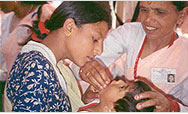Linking Family Planning and the Environment
 |
| Improved rice cultivation can reduce pressure on the surrounding forest. Source: USAID |
Despite abundant natural resources, Madagascar remains one of
the poorest countries in the world, facing escalating environmental
devastation and declining health conditions. The Malagasy population
continues to suffer from diseases long controlled in other countries,
including plague, leprosy, and cholera, as well as rapidly emerging
and spreading diseases such as HIV/AIDS, poverty-induced malnutrition,
and high fertility rates. Madagascar’s family planning (FP) program
focuses on hard-to-reach villages located in areas surrounding
Madagascar’s parks and protected areas.
Madagascar’s rich and unique biodiversity is increasingly threatened
by unsustainable agricultural practices, such as slash-and-burn farming.
This practice has become more destructive as the area’s population
has increased. The U.S. Agency for International Development (USAID)
works in these biodiversity hot spots to improve farming techniques
and protect the environment while also providing FP to hard-to-reach
communities, where total fertility rates often exceed the already high
national average of six.
Honorine, for instance, is a 42-year-old woman living in a remote village
of approximately 250 people located in eastern Madagascar. She has
been married for 24 years and has had 10 children, two of whom died
at a very young age. Her last birth was extremely complicated, and a
health care worker at the health center advised her to start using an
FP method. After receiving counseling on the various methods available,
she chose three-month injectables, which are not only easy to use,
but also she does not have to remember to take a pill every day.
Additionally, she only has to make the two-hour walk to the nearest
health center once every three months.
Honorine’s husband has been extremely supportive of her decision to
use a contraceptive method. The couple had heard of FP after their third
child but decided to wait and have a few more children. Both Honorine
and her husband realized that using a method of family planning has
helped her overall health because she does not have to fear complications
from childbirth any longer.
She also works with an improved rice cultivation technique. This cultivation
technique improves yields, allowing for less extended agriculture, and
minimizing cutting of forests. If properly performed, farmers can quadruple
the size of their annual crop, which reduces pressure on the surrounding
forest and provides additional income while increasing the community’s
available food supplies.
January 2008
Related Resources
|


